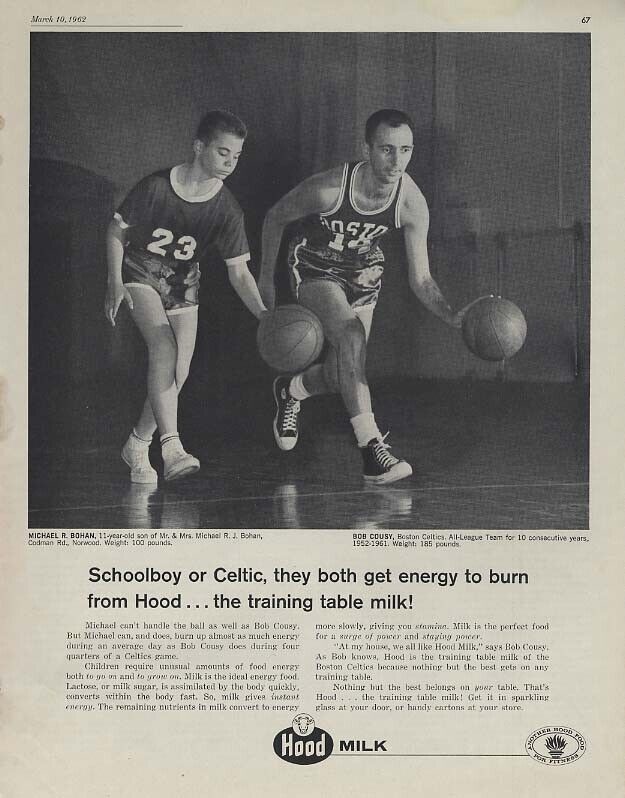Bob Cousy helped revolutionize the point guard position while playing for the Boston Celtics between 1950 & 1963, contributing to six NBA Championships. During this time, Cousy was a 13-time NBA All-Star and received the MVP award in 1957. Beloved as a player, his retirement ceremony became known as the “Boston Tear Party.” His legacy is extraordinary, encompassing the organization of the National Basketball Players Association, the popularization of modern guard play, the elevation of the NBA’s profile, the reception of a Presidential Medal of Freedom, and the naming of numerous basketball awards in his honor. Additionally, Cousy was well-known for his public stance against racism. Unfortunately, he doesn’t have many basketball card options, with only ten items needed to complete his PSA Master Set Registry. While many collectors target his 1957 Topps or 1951 Berk Ross cards for their collections, my favorite is the 1963 HP Hood Dairy oddball.
Here’s what VintageBasketball.com wrote about it:
Bob Cousy retired in 1963 and went to work doing promotions and clinics for the H.P. Hood Dairy Company. These 2 3/8″ x 3 7/8″ cards were distributed during this time period. Bob Cousy confirmed to a collector friend of mine that he used these cards during the period from 1963-1966. One of the Massachusetts-based company’s slogans during this period was “Schoolboy or Celtic, they both get energy to burn from Hood Milk!” The cards come in two variations. The most common variation has a blue ink facsimile signature and says “yours for better fitness, Bob Cousy”. At the bottom of the card it has the Hood logo and below that, it has the “Boston Traveler” logo. The Boston Traveler was a newspaper that is now defunct. The other variation is in black ink and only has the Hood Dairy emblem. Currently, the reason for the difference in cards is unknown. The Boston Traveler newspaper did go out of business in 1967, so maybe Hood had plans to use these cards longer?? We may never know. The black ink Hood card appears to be the rarer of the two. Twenty years ago, it was believed that these cards were exceedingly rare. However, as time has gone on, we have seen a few small finds of these, which have brought the price down slightly. I’ve also included an image of an 11 x 17 advertisement for John Alden fine foods that uses the Cousy graphic from this card.


I’m unsure when that overview was written, but regarding the black ink variation, Heritage Auctions sold a lot of nine of them in June 2022 for $1320.


PSA doesn’t appear to differentiate between variations in its Pop Report, which contains 22 cards and six autographed copies; SGC has graded six.
Despite the cards’ relative scarcity, they’re not that expensive. In 2021, Probstein sold a trio of them on eBay: a PSA 5 sold for $202 in March, a PSA 6 went for $472 in April, and a PSA 4 for $143 in July. He also sold a PSA 2 for $406 in June 2014.

That said, a PSA 7 (the highest graded) sold for $2,247 on eBay in November 2024.

Lelands sold the original photograph used for the card in November 2023 for $3,540.


Interestingly, I found an advertisement for Hood Milk for sale on eBay a while ago. It was described as coming from the Saturday Evening Post and is dated March 10, 1962, in the upper-left corner. The image looks like it could have been taken on the same day as the PSA Type 1 photo that Lelands sold, and the timeline fits the description of the Cousy card being used from 1963 to 1966.

The same image used on the 1963 HP Hood Diary Cousy card was also used for the souvenir program for “Bob Cousy Day” at Boston Garden on March 17, 1963, aka The Boston Tear Party. In April 2021, SCP Auctions sold the following team-signed copy for $3,769.

The scarcity of basketball card options for iconic figures is an unfortunate reality of the hobby. However, Bob Cousy played a big part in the growth of basketball in America, which led to the abundance of basketball card options that emerged in the late ’80s.
Happy collecting!